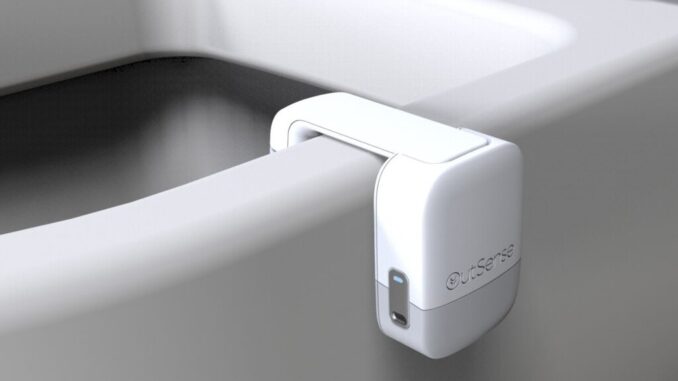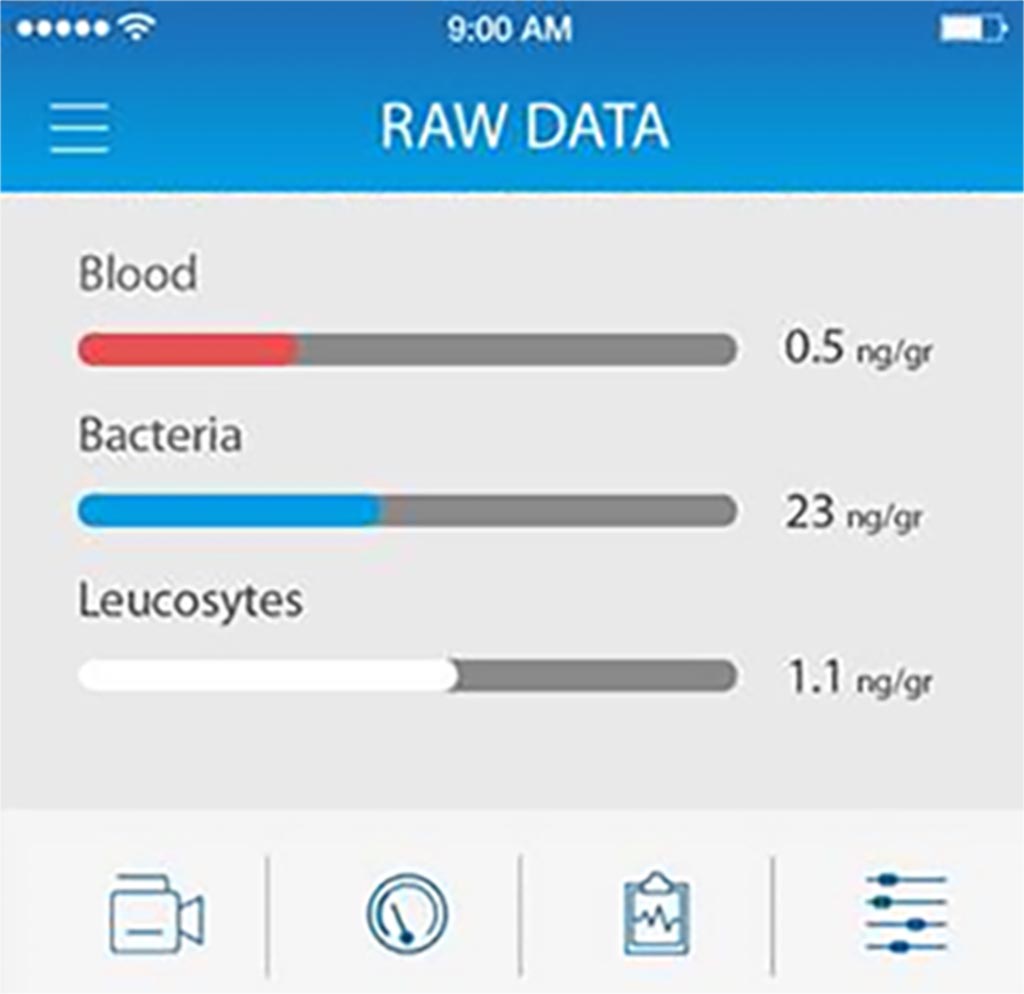
OR YEHUDA, Israel — Colorectal cancer grows slowly and can be cured when detected early. Yet nearly 700,000 people die of the disease every year worldwide, mainly because it’s just so very unpleasant to provide a stool sample and undergo a screening colonoscopy.
Now there’s an early screening device coming to the market that doesn’t require you to do anything but sit on the toilet.
The OutSense IoT (Internet of Things) sensor clips onto the toilet and operates automatically, non-invasively, discreetly and without active user intervention.
Using multispectral optical sensors, an illumination module and an autonomous controller with a Wi-Fi receiver, it scans solid waste for even tiny traces of blood — a possible sign of disease that can be missed by the lab-based fecal immunological test (FIT).
The sensor “knows” who is sitting on the toilet based on the closest smartphone, so each user of the OutSense app must bring his or her phone to the bathroom.
Real-time analysis is conducted in the cloud using OutSense’s proprietary computer vision algorithms and AI (artificial intelligence). Notification of any abnormal results is sent immediately to the smartphone of the user or caregiver — no need to take a sample to the lab or wait for results.

The OutSense interface shows results of a real-time feces analysis. (Courtesy: Outsense)“Our technology allows users and patients to have their excretions scanned automatically and immediately receive actionable insights based on the underlying chemical and physical composition,” says Yfat Scialom, CEO of OutSense.
“The solution provides new ways for early detection of potential severe gut problems, such as colorectal cancer, and for improving health and quality of care.”
Detecting other ailments
OutSense’s proprietary technology doesn’t only screen for colorectal cancer.
The technology also can detect dehydration, urinary tract infections, constipation, and diarrhea — all major causes of physical deterioration and hospitalization of the elderly.
A pilot study of the sensor is planned in Japan for detection of dehydration and urinary tract infections in the elderly, in cooperation with a multibillion-dollar Japanese corporation that specializes in remote elderly care technologies.
“Besides the medical impact, this solution also gives people new ways to improve their wellness, improve compliance to medications, and monitor diets and personal nutritional needs,” says Scialom.
This is a different approach from the Israeli startup DayTwo, which uses a questionnaire, stool-sample kit and blood-test result to analyze the user’s microbiome and offer personalized nutrition and dietary recommendations.
“DayTwo takes a snapshot in time, while OutSense is like Waze, checking what’s going on at all times,” says Scialom. There may be possibilities for collaboration in the future.
Clinical trials ahead of FDA application
Founded in 2016 by Israeli biomedical engineer and serial medtech entrepreneur Ishay Attar, OutSense started at the Incentive Incubator owned and operated by Peregrine Ventures in partnership with the Israel Innovation Authority.
Initial preclinical and clinical studies facilitated by a $2.5 million seed investment proved OutSense 90% accurate in detecting traces of blood in stool.
In November, the startup raised an additional $2.2 million in a Series A round from Peregrine Ventures to complete development and testing.
OutSense is completing its final design and expanding trials in Israel and abroad with an eye toward initiating the approval process with the U.S. Food and Drug Administration and other regulatory bodies next year.
“OutSense is looking for additional strategic partners and is planning another fundraising round next year that will enable the company to begin marketing efforts,” says Scialom.
She tells Zenger News that users will pay “a relatively low one-time hardware fee plus subscription fees. The logic behind the subscription fee is that the entire analysis is done in a lab on the cloud. The data that is collected in the cloud will enable us to give personalized feedback.”
The clip-on works on batteries, but in the future could be integrated into the seat or bowl at the manufacturing stage.
Waste database
OutSense also aims to create what it says would be the world’s first and largest database of human waste.
“This is especially crucial in colorectal cancer and other conditions which often go undiagnosed,” notes Scialom, who came aboard in February from patient-monitoring company EarlySense.
Eventually the technology could be used to detect the onset of an epidemic like Covid-19, as well as for personalized care, biofeedback, fine-tuning of drug dosage and even for personalized nutrition for weight control.
The OutSense team includes such experts as CSO Tali Treibitz, former head of the Marine Imaging Lab at the University of Haifa; CTO Yaara Kaap Barnea, who has a Ph.D. in biology and specializes in biometric monitoring; and Director Yoni Weiss, a physician and venture capitalist.
OutSense was accepted as an Intel Ingenuity Partner Program, received a Horizon 2020 grant and won second place in the 2018 China Heyuan International Mobile Innovation and Entrepreneurship Competition. The startup also received recognition from the California Israel Chamber of Commerce in 2017.
A version of this article appeared first on ISRAEL21c.
(Edited by Matthew B Hall and David Martosko)
The post Flush with Possibilities: Toilet Sensor Set to Transform Colorectal Cancer Screening appeared first on Zenger News.
